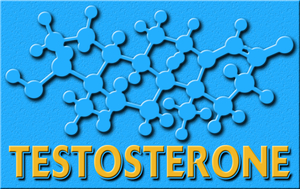The sports world has been riddled with the use of performance enhancing drugs. These can be anabolic steroids, HGH, artificial stimulants, or blood boosters. We have seen steroids rock the baseball world over and over again and blood doping shatter the cycling world. Although more under the radar, it is pervasive in high school sports. Its hard for athletes to feel like they are playing on a level playing field, when guys are injecting steroids and look like bodybuilders.The truth is, using these drugs are completely unnecessary. You could spare the disgrace of getting caught and dealing with the harsh side effects and instead spend a little time with a biochemistry book.
Testosterone promotes lean body mass, increases recovery time and gives a psychological edge of confidence, concentration, cognitive function and determination. Low testosterone leads toobesity, loss of muscle, weak bones and depression, but also increases the odds of heart disease, diabetes, Alzheimers and other major health problems. Its at its peak throughout puberty, and continues to serve you well until around 40. However levels are changing dramatically in every age bracket, making it especially important to understand what keeps testosterone from dropping. Researchers have been reporting that testosterone levels are getting lower with each generation, evident in the ability of guys able to zip up skinny jeans. Studies are showing substantial drops unrelated to age, showing a drop of 1 percent per year. This means a65-year-old man in 2002 would have testosterone levels 15 percent lower than those of a 65-year-old in 1987 and a proportion of men in 2002 would have had below-normal testosterone levels than in 1987.A Finnish study found that a man born in 1970 had 20 percent less testosterone at age 35 than his fathers generation at the same age.
While it may appear more clear on how to increase testosterone, there is much speculation at the moment as to the exact reasons why men have lower testosterone levels. Itseems fairly clear that it is a combination of xenoestrogens (chemical agriculture, cologne, plastic water bottles, face and body washes, creams) environmental pollutants, medications, sedentary lifestyle and a low-fat, high grain/sugar dietthat is contributing to this problem.In a recent Harvard study, men with the highest chlorpyrifos (organophosphate insecticide from chemical agriculture that has an affinity for fat and accumulates in feedlot meat, dairy and eggs) exposure typically had 20 percent less testosterone than those with the lowest exposure. This makes complete sense, since chemical agriculture was introduced in the early 1900s and has increased pesticide and insecticide use each year (since 1996, GMOs have pushed this amount even further).
Swimming is an excellent workout, but you might want to think twice about using chlorinated pools.Adolescents having attended indoor chlorinated pools for more than 250 hours before the age of 10 years old or for more than 125 hours before the age of 7 years old were about three times more likely to have an abnormally low total testosterone. I can verify this with teenage swimmers Ive seen in our practice with low total testosterone. Seek out salt water pools or use the ocean if you live on the coast. I would like to see parents, swimming coaches and water polo coaches taking this seriously and start lobbying schools to make the switch to salt water pools.
Anotherstudyfound thatthat high spikes in blood sugar was enough to drop testosterone levels by as much as25%in a random grouping of healthy, prediabetic, and diabetic men. Here we find the fallacy of loading up on refined grain carbohydrates and sugary sports drinks; these are making you weaker not stronger. Oxidative stress from exercise and pollutants also tax testosterone, making dietary antioxidants and adaptogens very important.
For a long time, the medical community pushed the avoidance of cholesterol rich food like eggs, meat (muscle and organs) and whole fat dairy due to the fear of high cholesterol levels. Then it became clear that dietary cholesterol has no barring on cholesterol levels, and actually is extremely important to consume.Meat, egg yolks, liver, heart and dairy products contain significant amounts of dietary cholesterol. In the body, this serves as an essential component of cell membranes, especially nerve tissues. In fact, cholesterol is a pre-cursor to vitamin D, testosterone, estrogen and adrenaline. The rate-limiting step in testosterone production is the conversion of cholesterol to pregnenolone. What happens if cholesterol is too low, and testosterone and vitamin D is too low? You get one depressed, weak and anxious individual. Let that sink in for a moment as you contemplate cholesterol lowering drugs and the push for low cholesterol levels.
Here is the conversion: What else can you see from this conversion chart? Cortisol (the stress hormone that wrecks havoc on your muscle) competes for building material (cholesterol) with testosterone. The adrenal gland rests on top of the kidneys and is composed of layers. On the outer layer you have the mineral corticoids which control your electrolyte balance. If you are not refueling with electrolytes, your body goes into the next later of corticosteroids that controls sugar and generates stress hormones. Overtraining, mental stress and emotional stress will lead to the third layer where you generate growth hormones and sex steroids. This is when you increase cortisol levels, robbing you blind of muscle, confidence and mental clarity; disrupting your ability toincrease testosterone.
The feedback mechanism called the hypothalamic-pituitary-adrenal axis or HPA axis controls reactions to stress, regulates digestion (stress causes indigestion), immunity, mood, emotions, sex drive, glycogen storage and calorie expenditure. This is why I recommend using Cordyceps, which have been found to balance the HPA axis and help you adapt to stress and prevent the catabolic effects. Especially for athletes, overtraining can be a chronic issue. It can be very hard to convince someone that taking a day off can sometimes be more productive than training. Overtraining will lead to excess cortisol, lowering testosterone, impairing long term performance, increasing muscle loss and decreasing mental function. Nothing will deplete your body and take your hard earned muscle and strength faster than cortisol.
A study published in the International Journal of Sports Medicine reveals that men who consumed the most fat also had the highest testosterone levels, while a study from theJournal of Clinical Endocrinology & Metabolismreported that a low-fat, high-fiber diet reduced testosterone levels in middle-aged men. A study also found that a high fiber diet with wheat bran also depletes vitamin D 43% faster.Adiet with less than 40 percent of energy as fat (including saturated) lead to a decrease in testosterone levels.Wait a second? You mean all of this time of promoting a low-fat diet fearful of saturated fats built upon the grain pyramid has been completely destroying muscle building testosterone and depleting vitamin D? Yes. So if you see someone pushing a diet that promotes low-fat, carbo-loading with bagels and asking if you ate your Wheaties this morning, run the other way with your testosterone rich body. They wont catch you.
Read the rest here:
How to Increase Testosterone Naturally: PaleoEdge
Contact Us Today For A Free Consultation

- Adverse Effects of Testosterone Therapy in Adult Men: A Systematic Review and Meta-Analysis [Last Updated On: July 2nd, 2024] [Originally Added On: June 4th, 2010]
- Low Testosterone Levels, Foods That Increase Testosterone Levels wwwSelf-Improvement-Bible.com [Last Updated On: November 12th, 2023] [Originally Added On: May 30th, 2011]
- Low Testosterone in Men: The Next Big Thing in Medicine! - Abraham Morgentaler, MD [Last Updated On: May 7th, 2023] [Originally Added On: June 3rd, 2011]
- How To Determine Testosterone Levels By Looking At Your Ring Finger [Last Updated On: December 7th, 2017] [Originally Added On: June 30th, 2011]
- Prolab Horny Goat Weed Testosterone Booster Supplement Review [Last Updated On: November 23rd, 2023] [Originally Added On: July 19th, 2011]
- The Healthy Skeptic: Products make testosterone claims [Last Updated On: August 13th, 2024] [Originally Added On: September 11th, 2011]
- How To Naturally Increase Testosterone [Last Updated On: November 21st, 2023] [Originally Added On: September 28th, 2011]
- Testosterone Production - Video [Last Updated On: November 25th, 2024] [Originally Added On: November 20th, 2011]
- Testosterone makes us less cooperative and more egocentric, study finds [Last Updated On: January 23rd, 2018] [Originally Added On: February 1st, 2012]
- Testosterone makes us less cooperative and more egocentric [Last Updated On: January 24th, 2018] [Originally Added On: February 1st, 2012]
- Too much testosterone makes for bad decisions, tests show [Last Updated On: April 30th, 2025] [Originally Added On: February 1st, 2012]
- Today in Research: Testosterone's Negative Effects; Diet Soda Death [Last Updated On: January 2nd, 2018] [Originally Added On: February 2nd, 2012]
- Testosterone drives ego, trips cooperation [Last Updated On: December 2nd, 2017] [Originally Added On: February 4th, 2012]
- FDA approves BioSante/Teva's testosterone gel [Last Updated On: April 28th, 2025] [Originally Added On: February 15th, 2012]
- 'Manly' Fingers Make For Strong Jawline in Young Boys [Last Updated On: December 1st, 2017] [Originally Added On: February 15th, 2012]
- Teva, BioSante Win U.S. Approval for Testosterone Therapy [Last Updated On: December 10th, 2017] [Originally Added On: February 15th, 2012]
- BioSante Gains on Approval of Testosterone Gel: Chicago Mover [Last Updated On: January 8th, 2018] [Originally Added On: February 16th, 2012]
- BioSante soars following drug approval from FDA [Last Updated On: December 26th, 2017] [Originally Added On: February 16th, 2012]
- Antibodies, Not Hard Bodies: The Real Reason Women Drool Over Brad Pitt [Last Updated On: December 24th, 2017] [Originally Added On: February 21st, 2012]
- Almark Publishing Releases Book From Mark Rosenberg, M.D. Revealing Natural Discoveries Associated With Low ... [Last Updated On: May 3rd, 2025] [Originally Added On: February 28th, 2012]
- Testosterone Replacement Clinic Comes to Kansas City with Potential to Help Thousands of Men [Last Updated On: May 2nd, 2025] [Originally Added On: March 1st, 2012]
- Study examines the relative roles of testosterone and its metabolite, dihydrotestosterone in men [Last Updated On: December 2nd, 2017] [Originally Added On: March 7th, 2012]
- The Role of 5{alpha}-Reductase Inhibition in Men Receiving Testosterone Replacement Therapy [Editorial] [Last Updated On: December 21st, 2017] [Originally Added On: March 7th, 2012]
- Effect of Testosterone Supplementation With and Without a Dual 5{alpha}-Reductase Inhibitor on Fat-Free Mass in Men ... [Last Updated On: January 3rd, 2018] [Originally Added On: March 7th, 2012]
- Why We Like Men Who Can Keep Their Cool [Last Updated On: December 30th, 2017] [Originally Added On: March 7th, 2012]
- Testosterone And Heart Health [Last Updated On: May 1st, 2025] [Originally Added On: March 10th, 2012]
- Your Life on Testosterone: Overly Sure of Yourself, Unwilling to Listen [Last Updated On: November 25th, 2018] [Originally Added On: March 15th, 2012]
- Mayo Clinic-TGen study role testosterone may play in triple negative breast cancer [Last Updated On: December 8th, 2017] [Originally Added On: March 23rd, 2012]
- A dose of testosterone might not cure what ails you [Last Updated On: January 23rd, 2018] [Originally Added On: March 25th, 2012]
- Green tea could aid athletes hide testosterone doping [Last Updated On: December 16th, 2017] [Originally Added On: March 25th, 2012]
- TGen Study Role Testosterone May Play in Triple Negative Breast Cancer [Last Updated On: December 6th, 2017] [Originally Added On: March 26th, 2012]
- Testosterone low, but responsive to competition, in Amazonian tribe [Last Updated On: January 23rd, 2018] [Originally Added On: March 28th, 2012]
- Competition-linked bursts of testosterone are fundamental aspect of human biology, study of Amazonian tribe suggests [Last Updated On: December 25th, 2017] [Originally Added On: March 28th, 2012]
- Playing football boosts testosterone levels by 30 percent! [Last Updated On: February 4th, 2024] [Originally Added On: March 28th, 2012]
- Testosterone low, but responsive to competition, in Amazonian tribe -- with slideshow [Last Updated On: December 9th, 2017] [Originally Added On: March 28th, 2012]
- The benefits of testosterone pellet therapy [Last Updated On: January 24th, 2018] [Originally Added On: March 29th, 2012]
- Low testosterone levels cause health woes [Last Updated On: November 25th, 2018] [Originally Added On: March 30th, 2012]
- Heart Failure Patients Getting Relief from Testosterone Supplements [Last Updated On: May 5th, 2025] [Originally Added On: April 21st, 2012]
- Study Finds Fatherhood Suppresses Testosterone [Last Updated On: May 4th, 2025] [Originally Added On: May 3rd, 2012]
- Low testosterone levels could raise diabetes risk for men [Last Updated On: January 26th, 2018] [Originally Added On: May 5th, 2012]
- Why low testosterone may increase your risk of diabetes [Last Updated On: November 25th, 2024] [Originally Added On: May 5th, 2012]
- Diabetes link to low testosterone [Last Updated On: November 25th, 2024] [Originally Added On: May 5th, 2012]
- Testosterone Linked to Weight Loss in Obese Men [Last Updated On: January 2nd, 2018] [Originally Added On: May 11th, 2012]
- Testosterone may help weight loss [Last Updated On: November 25th, 2024] [Originally Added On: May 11th, 2012]
- Testosterone-fuelled infantile males might be a product of Mom's behaviour [Last Updated On: December 25th, 2017] [Originally Added On: May 11th, 2012]
- Testosterone-fueled infantile males might be a product of Mom's behavior [Last Updated On: January 6th, 2018] [Originally Added On: May 11th, 2012]
- Testosterone supplements may help obese men lose weight [Last Updated On: January 5th, 2018] [Originally Added On: May 11th, 2012]
- Testosterone supplements 'can help men lose their middle-aged spread' [Last Updated On: November 25th, 2024] [Originally Added On: May 12th, 2012]
- Some doctors question safety of testosterone replacement therapy [Last Updated On: January 20th, 2018] [Originally Added On: May 15th, 2012]
- Health Canada Approves New Testosterone Topical Solution for Men [Last Updated On: May 15th, 2025] [Originally Added On: May 15th, 2012]
- Environment trumps genes in testosterone levels, study finds [Last Updated On: May 8th, 2025] [Originally Added On: May 15th, 2012]
- Global Testosterone Replacement Therapy (TRT) Industry [Last Updated On: May 7th, 2025] [Originally Added On: May 21st, 2012]
- Testosterone Fuels Boom, Swindler Sows Panic: Top Business Books [Last Updated On: January 13th, 2018] [Originally Added On: June 2nd, 2012]
- Increase in testosterone drug use [Last Updated On: April 12th, 2018] [Originally Added On: June 4th, 2012]
- Testosterone Promotes Agression Automatically [Last Updated On: January 29th, 2018] [Originally Added On: June 9th, 2012]
- Testosterone shown to help sexually frustrated women [Last Updated On: January 27th, 2018] [Originally Added On: June 9th, 2012]
- Research and Markets: Testosterone Replacement Therapy (TRT) - Global Strategic Business Report [Last Updated On: December 23rd, 2017] [Originally Added On: June 12th, 2012]
- Proposed testosterone testing of some female olympians challenged by Stanford scientists [Last Updated On: January 30th, 2018] [Originally Added On: June 14th, 2012]
- Testosterone Makes Bosses Into Jerks, Says Paul Zak [Last Updated On: January 8th, 2018] [Originally Added On: June 14th, 2012]
- Testosterone Therapy: A Misguided Approach to Erectile Dysfunction (ED) [Last Updated On: May 10th, 2025] [Originally Added On: June 20th, 2012]
- New drugs, new ways to target androgens in prostate cancer therapy [Last Updated On: January 8th, 2018] [Originally Added On: June 20th, 2012]
- Long-term testosterone treatment for men results in reduced weight and waist size [Last Updated On: January 19th, 2018] [Originally Added On: June 23rd, 2012]
- Declining testosterone levels in men not part of normal aging, study finds [Last Updated On: December 27th, 2017] [Originally Added On: June 23rd, 2012]
- Low testosterone not normal part of aging [Last Updated On: December 22nd, 2017] [Originally Added On: June 25th, 2012]
- Testosterone Does Not Necessarily Wane With Age [Last Updated On: December 6th, 2017] [Originally Added On: June 25th, 2012]
- Overweight men can boost low testosterone levels by losing weight [Last Updated On: December 10th, 2017] [Originally Added On: June 25th, 2012]
- Testosterone-replacement therapy improves symptoms of metabolic syndrome [Last Updated On: January 14th, 2018] [Originally Added On: June 26th, 2012]
- Testosterone therapy takes off pounds [Last Updated On: December 11th, 2017] [Originally Added On: June 26th, 2012]
- Weight loss may boost men's testosterone [Last Updated On: May 9th, 2025] [Originally Added On: June 27th, 2012]
- Low Testosterone? Study finds age may not be to blame [Last Updated On: May 12th, 2025] [Originally Added On: July 1st, 2012]
- Do you have low testosterone? [Last Updated On: December 15th, 2017] [Originally Added On: July 8th, 2012]
- Wall Streeters Buying Testosterone for an Edge [Last Updated On: May 11th, 2025] [Originally Added On: July 12th, 2012]
- Beefy Wall Street Traders rub on testosterone [Last Updated On: February 20th, 2024] [Originally Added On: July 12th, 2012]
- Tale of two runners exposes flawed Olympic thinking [Last Updated On: December 23rd, 2024] [Originally Added On: July 19th, 2012]
- Genetic markers for testosterone and estrogen level regulation identified [Last Updated On: January 6th, 2018] [Originally Added On: July 20th, 2012]
- BUSM researchers identify genetic markers for testosterone, estrogen level regulation [Last Updated On: December 18th, 2017] [Originally Added On: July 20th, 2012]
- DRS. OZ AND ROIZEN: How to reap the benefits of normal testosterone levels [Last Updated On: December 23rd, 2024] [Originally Added On: July 21st, 2012]
- How Testosterone Drives History [Last Updated On: December 24th, 2024] [Originally Added On: July 22nd, 2012]
- Testosterone replacement is "fountain of youth" for men [Last Updated On: January 3rd, 2018] [Originally Added On: July 27th, 2012]
- Pill for low testosterone in men heads for phase II clinical trials [Last Updated On: December 31st, 2017] [Originally Added On: August 2nd, 2012]
Word Count: 1158




















